Recognizing Teaching Excellence in Computer Science
By Jake Baskin @jakebask | May 22, 2017
As Executive Director of the Computer Science Teachers Association, Jake Baskin leads the world’s leading association for K-12 computer science teachers. He is a former high school computer science teacher, department chair, and professional development provider with the Chicago Public Schools. Prior to joining CSTA, Jake was Director of State Government Affairs for Code.org, and worked with educators and policymakers to advocate for policies that expand access to high-quality computer science education with state departments of education and governor’s offices across the US.
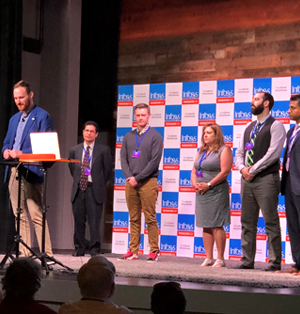
I’m thrilled to announce Sandra Czajka, Martin Fish, Bobby Oommen, Ryan Robidoux, and Dylan Ryder as the 2018 winners of the CSTA / Infosys Foundation USA Teaching Excellence Award. The award, launched in 2017, is designed specifically to highlight outstanding computer science teachers from all grade levels who have been in the computer science classroom for at least two years. These five teachers stood out among a very competitive pool of applicants for their innovative practices and long term commitment to ensuring all of their students have access to high quality computer science education. Based on the descriptions below it’s clear that these teachers fit the bill.
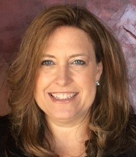
Sandra Czajka teaches AP Computer Science-A and AP Computer Science Principles at Riverside Brookfield High School in Oak Park, IL. Sandy encourages students to take her class as long as they are willing to do the work. She wants to give students the opportunity to become successful. "I have seen, first-hand, the impact she has on our students,” said Kylie Lindquist, Assistant Principal for Curriculum and Instruction ant Riverside Brookfield High School. “In Sandy's class, students are challenged to think deeply and critically and they are pushed stretch themselves each and every day. Students rise to the high expectations Sandy has for them because they know they are supported at all times. Sandy's classroom is a cognitively-busy space where students work together to problem-solve, take risks, and create."
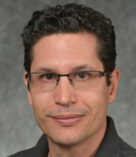
Martin Fish teaches at Mason Middle School in Mason, OH. Martin started an after school Coding and Robotics club, in 2013. Martin worked with his school administration along with a local foundation to develop the club into a semester long class. The Mason Middle School Coding and Robotics STEM Lab now reaches over 300 students each year. Since inception, Martin has introduced coding to over 1,000 middle school students. Martin is interested in helping grow the number of elementary and middle school teachers who are including computer science in their courses. According to Dan Little, Innovation Learning Coach at Mason City Schools Martin is “one of the most student centered, compassionate, hardworking, and innovative teachers I have ever had the pleasure of working with.” This summer Martin will serve on a committee helping the State of Ohio develop Computer Science educational standards.
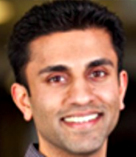
Bobby Oommen launched the computer science program at the Latin School of Chicago, IL, including writing curriculum, integrating computer science through cross-curricular projects, and determining new ways to get faculty and students involved in computer science. Bobby developed a unique partnership model for his school to connect with others in the city. “Bobby quickly saw past the paradigm of one school "helping" another school without a full CS program,” said Sarah A. Bunger, Director, Uptown Partnership, Latin School of Chicago. “He created a way in which two schools could benefit from whatever resources were available.” Bobby also collaborated with Code.org to help write Computer Science Discoveries, a middle school Computer Science curriculum.
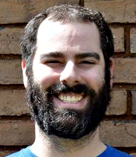
Ryan Robidoux is the Computer Science teacher at Old Colony Regional Vocational Technical High School in Rochester, MA where he has transformed the Programming and Web Development program into a rigorous Computer Science curriculum. Ryan integrated a focus on authentic problem solving and project-based learning experiences for his students. His 11 and 12 grade computer science students participate in software projects that help solve problems within their local and school community. According to one of his students, “Mr. Robidoux has a vast knowledge and experience base. This truly shown whether be is explaining what to expect when we get into college, or discussing a lab on the difference between data types. However, his intelligence does not even scrape the surface of his abilities. On top of his knowledge, he is passionate about his work, and cares immensely about every single one of bis students. Mr. Robidoux will take time out of his day to help a struggling student for as long as it takes.” Ryan is a member of the Southeastern Massachusetts STEM Network advisory board and helped organize an “Educating for the Future” STEM event at Old Colony.
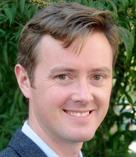
Dylan Ryder is an Educational Technologist at The School at Columbia University. Dylan works with the University’s K-8 laboratory school based in New York City. Dylan’s goals are to help students use technology with attention towards engineering design, computer science, and generative arts. According to John Baglio, Engineering/Computer Science Teacher at Fieldstone Middle School, “He also approaches his work with an eye toward progressive pedagogy. What is developmentally appropriate? What gives the students the most agency in this project? What helps them become engaged? In numerous conversations, Dylan has helped shape my own thoughts about teaching while grappling with these very issues.” Dylan has published articles on STEAM curriculum development, and has delivered several workshops at conferences, schools and universities around the country.
It was a pleasure to recognize these teachers at the opening of Crossroads, the annual conference from Infosys Foundation USA, and I look forward to them sharing their experiences and advice at the CSTA annual conference this summer. Along with attending Crossroads and the CSTA annual conference, as winners of the award, each teacher will also receive $5,000 in recognition of their outstanding work.
I also would like to extend a huge thank you to Infosys Foundation USA for their partnership on this award.Their support of this award allows us to recognize and honor the important and exemplary work these computer science educators are doing every day in their classrooms.

